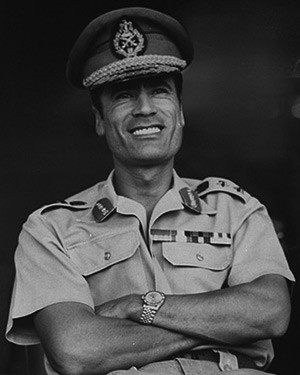Muammar Qaddafi: A Retrospective
The world's longest ruling head of state, Mu'ammar al-Qadhdhafi (the correct transliteration of his name), would have been ruler of Libya for exactly 42 years on Sept. 1. As he leaves the scene, his wretched reign deserves an appraisal.
On taking power, Qaddafi was one of the most handsome of public figures. |
Qaddafi took power at the age of 27 in the waning days of Gamal Abdel Nasser, the immensely influential pan-Arab leader of Egypt, and saw himself as Nasser's acolyte but with a greater ambitions: whereas Nasser dreamed of a single Arab nation stretching from the Atlantic to the Persian Gulf as an end in itself, Qaddafi saw Arab unity as the first step to Muslim unity. Although Qaddafi failed to achieve any sort of unity, and his "Third International Theory" detailed in the 1975 Green Book proved a total bust, he did have an early and marked impact on two major developments.
First, he had a key role in the increase in energy prices that began in 1972 and continues to this day. By challenging the international oil companies' control over petroleum production and pricing, he began the transfer of power from Western boardrooms to Middle Eastern palaces. Specifically, the chances Qaddafi successfully took helped bring about the four-fold increase in oil prices of 1973-74.
Second, Qaddafi kicked off what was then known as the Islamic revival and also still continues. At a time when no one else was ready to do so, he proudly and provocatively advanced Islamic causes by applying aspects of Islamic law, calling on Muslims worldwide to do likewise, and assisting any Muslims in conflict with non-Muslims.
Qaddafi's long rule can be divided into four eras. The first and most significant, 1969-86, consisted of frenetic activity on his part, meddling in issues and conflicts from Northern Ireland to the southern Philippines. An incomplete listing would include the near crippling of Jimmy Carter's 1980 re-election campaign by making payments to his brother Billy; declaring political union with Syria; aiding Iran militarily versus Iraq; threatening Malta over oil exploration in contested waters; bribing the Cypriot government to accept a Libyan radio transmitter; sending troops to southern Chad to control the country and unify with it; and helping a Muslim group in Nigeria whose violence left over 100 dead.
Symbolic of his regime's decay, Qaddafi eventually became one of the ugliest public figures. |
But these efforts led nowhere. As I wrote in a 1981 assessment, "Not one of Qaddafi's attempts at coups d'état has toppled a government, not one rebellious force has succeeded, no separatists have established a new state, no terrorist campaign has broken a people's resolve, no plan for union has been carried through, and no country save Libya follows the 'third theory.' Qaddafi has reaped bitterness and destruction without attaining any of his goals. Greater futility can scarcely be imagined."
That first era ended with the U.S. bombardment of 1986 in retaliation for the bombing of a discotheque in Berlin, which seemed to affect Qaddafi's psyche. His rabid adventurism dramatically declined, accompanied by a turn toward Africa and an ambition to build weapons of mass destruction. As his presence on the world stage shriveled, he was dismissed as a nut-job.
A third stage began in 2002, when a tamed Qaddafi paid reparations for the Libyan role in the 1988 downing of a Pan Am plane and gave up his nuclear ambitions. Although the fundamentals of his regime remained in place, he became persona grata in Western countries, while the British prime minister and American secretary of state paid their respects to him in Libya.
Arguably, Qaddafi was even uglier in person than this caricature near Misurata. |
The fourth and final era began earlier this year, with the Benghazi rebellion, when Qaddafi in retreat reverted to the explicit brutality of his earlier rule, casting aside the carefully constructed image of someone newly paying attention to international expectations. With his regime in the balance, his viciousness and delusion took center stage and the results were devastating, with Libyans in great numbers rejecting him, his family, his regime, and his legacy.
After decades of repression and deceit, Libyans now face the challenge of discarding that foul legacy. They must struggle to free themselves of paranoia, depravity, and contortion. As Andrew Solomon of the New Yorker summed up the problem, Libyans "may recover from the Qaddafis' embezzlement and brutality, but the falseness of life in the Great Socialist People's Libyan Arab Jamahiriya will take a long time to fade."
Indeed it will.



